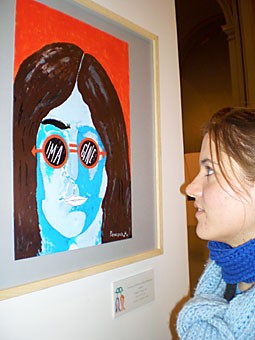Over my time spent in Spain, I’ve been surprised by the overt machismo that Spanish men display, as opposed to the subtle patriarchy upheld by men in America. The men in Spain, unlike the rain, don’t fall only on the plain. They fall on anything that has breasts.
“”Despite how loud the rhetoric is or how much we discuss the advancement of gender equality, women still get the short end of the stick – no pun intended,”” said Alison Heard, 22, a creative writing senior currently studying abroad in Alcalá de Henares, Spain.
Heard was one of the many visitors to the opening night of the 14th International Exhibit of Graphic Humor. Graphic artists from around the world entered comics and various drawings for the chance to win the prestigious Quevedos Award. The Quevedos Award is given out every year and named after the Baroque poet Francisco de Quevedo.
Typical of the Baroque period, Quevedos often satirized the people around him and the hypocrisy of social institutions like the church. It’s for this reason that the Quevedos Award congratulates artists who successfully intersperse humor into social issues.
Among themes of women doing housework, lazy men, Adam and Eve satires and various clever uses of the male and female symbols, stark juxtapositions stood out with their raw truth.
Mexican artist Cintia Bolio daringly portrayed a uterus and fallopian tubes being crucified in her work “”Iglesias cristianas unidas se unieron,”” or “”Christian churches united unite.””
Turkish artist Ertan Hyhan Sertóz entered his work illustrating a man and woman in close embrace while the male and female symbols surround them like hula hoops.
This exhibit made me wonder just how different cultures approached the issue of gender inequality. Many cultures and countries have recognized the problem, as displayed in this art exhibition.
I asked American study abroad students about their opinions on gender equality and their own experiences with it. In the fashion of demure modesty, many women were reluctant to talk to me at first, telling me that they didn’t want to complain.
It is this attitude that perpetuates the oppression of women because they are made to think they are alone in their feelings of subjugation. Society portrays women as whiners when they speak out about maltreatment – another theme of the exhibit involved the portrayal of women finally confronting men about unfair wages and unjust treatment. I found these depictions to be sadly utopian, but always comical, as the exhibit focused on parodies.
Twenty-year-old Elizabeth Huggins is in her third year studying Spanish at Butler University. She studied in Mexico for a summer and is currently at the University of Alcalá. Among the distinctions found in Spanish, Mexican and American men’s attitudes towards women, she discovered that in Mexico it is common for a man to whistle, catcall or honk his horn at a woman.
“”It doesn’t matter what you look like,”” Huggins said. “”I find Spanish men a lot more aggressive because they will actually come up and presume that if you look at them or say hello to them it’s an invitation to get intimate or close.””
The repercussion of such obnoxious behavior is that Spanish women are notoriously cold. If you are a man, they will not even talk to you unless they actually know you. For this reason, many men aim for the “”easy”” American girls, who are surprised by such forward behavior and coquettishly giggle, being used to temerity from the opposite sex. Female tourists quickly find that they must not make eye contact with men on the street or surely harassment will ensue.
When I receive unwanted advances, I like to employ my personal favorite technique, which is to flat out ignore the man harassing me. If this is not effective, I will turn to him and make wild gestures signaling that I am deaf. It’s also effective when I start picking my nose and eating my boogers.
“”If you’re a girl, guys are staring at you constantly,”” said Lily Pape, a senior majoring in English and Spanish, of her experiences at nightclubs. “”You can’t just dance and have fun. If you so much as smile in their direction, they will think that you want them to flirt with you.””
The gender equality exhibit gave me hope that people are on the right path towards equality between the sexes. I feel that there is a long way to go, but if Alcoholics Anonymous has taught me anything, it is that the first step is to admit you have a problem. Indeed, the existence of this exhibit validates the elusive dilemma and will hopefully help shape its solution.









